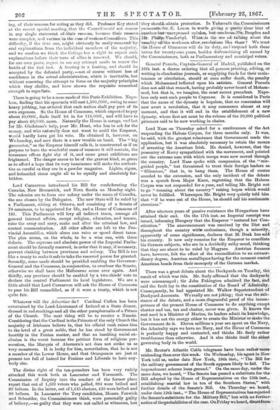Lord Carnarvon introduced his Bill for confederating the Canadas, New
Brunswick, and Nova Scotia on Monday night. The colonies are to form one colony under the name of Canadia, the one chosen by the Delegates. The new State will be ruled by a Parliament, sitting at Ottawa, and consisting of a Senate of 78 nominees, to be appointed for life, and,a House of Commons of 181. This Parliament will levy all indirect taxes, manage all general internal affairs, except religion, education, and tenure, raise the army and navy, make and alter the criminal law, and control communication. All other affairs are left to the Pro- vincial Assemblies, which alone can raise or spend direct taxes. The plan seems, on the whole, to be a wise one, with three defects. The supreme and absolute power of the Imperial Parlia- ment should be formally reserved, in order that it may, if necessary, prevent clashing between provinces and colony. The Bill is too like a treaty to make it safe to take the reserved power for granted. Secondly, some mode should be provided enabling the Governor- General and the Commons, in conjunction, to overbear the Senate, otherwise we shall have the Melbourne scene over again. And thirdly, any province should be enabled by a two-thirds' vote to declare the central Parliament its local legislature. We are a little afraid that Lord Carnarvon will ask the House of Commons to pass his Bill unmodified, as if it were a treaty, which is not quite fair.






























 Previous page
Previous page